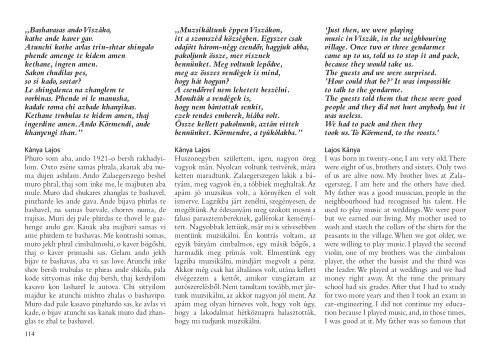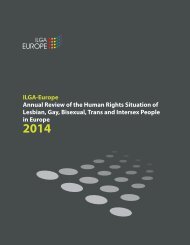You also want an ePaper? Increase the reach of your titles
YUMPU automatically turns print PDFs into web optimized ePapers that Google loves.
„Bashavasas ando Viszáko,<br />
kathe ande kaver gav.<br />
Atunchi kothe avlas trin-shtar shingalo<br />
phende amenge te kidem amen<br />
kethane, ingren amen.<br />
Sakon chudilas pes,<br />
so si kado, sostar?<br />
Le shingalenca na zhanglem te<br />
vorbinas. Phende vi le manusha,<br />
kadale roma chi azbade khanyikas.<br />
Kethane trubulas te kidem amen, thaj<br />
ingerdine amen. Ando Körmendi, ande<br />
khanyengi than.”<br />
Kánya Lajos<br />
Phuro som aba, ando 1921-o bersh rakhadyi -<br />
lom. Oxto zséne samas phrala, akanak aba nu -<br />
ma dujen ashilam. Ando Zalaegerszego beshel<br />
muro phral, thaj som inke me, le majbuten aba<br />
mule. Muro dad shukares zhanglas te bashavel,<br />
pinzharde les ande gava. Ande bijava phirlas te<br />
bashavel, na samas barvale, chorres numa, de<br />
tra jisas. Muri dej pale phirdas te thovel le gaz -<br />
henge ando gav. Kanak aba majbari samas vi<br />
ame phirdem te bashavas. Me kontrashi somas,<br />
muro jekh phral cimbalmoshi, o kaver bögôshi,<br />
thaj o kaver primashi sas. Gelam ando jekh<br />
bijav te bashavas, aba vi sas love. Atunchi inke<br />
shov bersh trubulas te phiras ande shkola, pala<br />
kode sittyomas inke duj bersh, thaj kerdyilom<br />
kasavo kon lasharel le autova. Chi sittyilom<br />
maj dur ke atunchi mishto zhalas o bashavipo.<br />
Muro dad pale kasavo pinzhardo sas, ke avlas vi<br />
kade, o bijav atunchi sas kanak muro dad zhanglas<br />
te zhal te bashavel.<br />
114<br />
„Muzsikáltunk éppen Viszákon,<br />
itt a szomszéd községben. Egyszer csak<br />
odajött három-négy csendôr, hagyjuk abba,<br />
pakoljunk össze, mer visznek<br />
bennünket. Meg voltunk lepôdve,<br />
meg az összes vendégek is mind,<br />
hogy hát hogyan?<br />
A csendôrrel nem lehetett beszélni.<br />
Mondták a vendégek is,<br />
hogy nem bántottak senkit,<br />
ezek rendes emberek, hiába volt.<br />
Össze kellett pakolnunk, aztán vittek<br />
bennünket. Körmendre, a tyúkólakba.”<br />
Kánya Lajos<br />
Huszonegyben születtem, igen, nagyon öreg<br />
vagyok mán. Nyolcan voltunk testvérek, mára<br />
ketten maradtunk. Zalaegerszegen lakik a bá -<br />
tyám, meg vagyok én, a többiek meghaltak. Az<br />
apám jó muzsikus volt, a környéken el volt<br />
ismerve. Lagzikba járt zenélni, szegényesen, de<br />
megéltünk. Az édesanyám meg szokott mosni a<br />
falusi parasztembereknek, gallérokat kemé nyí -<br />
tett. Nagyobbak lettünk, már mi is szívesebben<br />
mentünk muzsikálni. Én kontrás voltam, az<br />
egyik bátyám cimbalmos, egy másik bôgôs, a<br />
harmadik meg prímás volt. Elmentünk egy<br />
lagziba muzsikálni, mindjárt megvolt a pénz.<br />
Akkor még csak hat általános volt, utána kellett<br />
elvégezzem a kettôt, amikor vizsgáztam az<br />
autó szerelésbôl. Nem tanultam tovább, mer jár -<br />
tunk muzsikálni, az akkor nagyon jól ment. Az<br />
apám meg olyan hírneves volt, hogy volt úgy,<br />
hogy a lakodalmat hétköznapra halasztották,<br />
hogy mi tudjunk muzsikálni.<br />
‘Just then, we were playing<br />
music in Viszák, in the neighbouring<br />
village. Once two or three gendarmes<br />
came up to us, told us to stop it and pack,<br />
because they would take us.<br />
The guests and we were surprised.<br />
’How could that be?’ It was impossible<br />
to talk to the gendarme.<br />
The guests told them that these were good<br />
people and they did not hurt anybody, but it<br />
was useless.<br />
We had to pack and then they<br />
took us. To Körmend, to the roosts.’<br />
Lajos Kánya<br />
I was born in twenty-one, I am very old. There<br />
were eight of us, brothers and sisters. Only two<br />
of us are alive now. My brother lives at Zala -<br />
egerszeg, I am here and the others have died.<br />
My father was a good musician, people in the<br />
neighbourhood had recognised his talent. He<br />
used to play music at weddings. We were poor<br />
but we earned our living. My mother used to<br />
wash and starch the collars of the shirts for the<br />
peasants in the village. When we got older, we<br />
were willing to play music. I played the second<br />
violin, one of my brothers was the cimbalom<br />
player, the other the bassist and the third was<br />
the leader. We played at weddings and we had<br />
money right away. At the time the primary<br />
school had six grades. After that I had to study<br />
for two more years and then I took an exam in<br />
car-engineering. I did not continue my education<br />
because I played music, and, in those times,<br />
I was good at it. My father was so famous that



